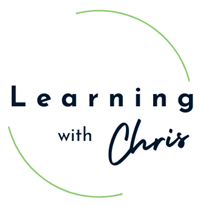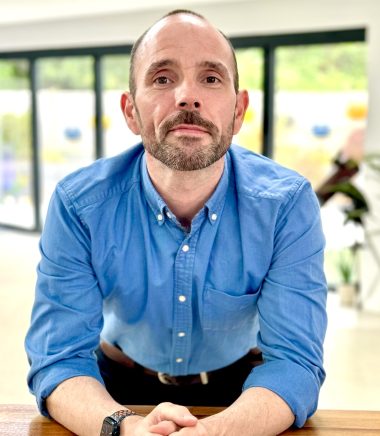
Learning with Chris offers a range of development for improved mental health and wellbeing. Everything focuses on the importance of awareness and action, offering practical support in a safe environment so that people can make positive, tangible and lasting changes.
These workshops are facilitated virtually for groups of up to 20 people, in either 60 or 90 minutes, which allows more time for group debate and activity.
Workshops are £765 for up to 20 people per session, with the exception of personality profiling workshops. Discounts are available for charities and bookings of three or more sessions.
Book a 30 minute call to find out more or get in touch.

About the Workshops
Now more than ever, we bring our whole selves to work, mental health and all. Long gone are the days when it was acceptable to tell people to ‘leave it at the door’. That’s not only uncaring, it’s impossible. Mental wellbeing must be viewed just as importantly as our physical wellbeing. For that to be understood and embraced, people need a solid foundation to build from.
We’ll explore the basics of mental health, including common conditions and the challenges people face. By learning to recognise the signs of mental health issues helps people to look after themselves whilst also supporting others.
Reducing stigma is crucial for creating a healthy work environment. We’ll discuss why this matters and share resources for support, as well as tips for improving communication about mental health.
- Understand the basics of mental health, including workplace challenges and common conditions.
- Develop skills to identify early warning signs of mental health struggles.
- Learn practical ways to foster a stigma-free workplace and where to find support.
Resilience: that magic juice that gives us strength, particularly when life blindsides us, as it has a habit of doing.
It’s often compared to ‘bounce-back-ability’, yet who wants to bounce backwards? Resilience is about developing the reserves that help us to keep moving forward, even if that sometimes means simply crawling forward.
Press the pause button to take stock of where you and your resilience are at the moment, and the coping strategies you are leaning on that could be helping or harming your wellbeing.
- Define ‘resilience’ and tune into your personal levels.
- Consider your current coping mechanisms and reflect on which may be helping and harming your levels of resilience.
- Take action towards a 10 point plan to develop your resilience.
Stress is something that we all encounter, both at work and in our personal lives. We don’t often tend to stop to reflect on the stressors flowing into our lives, our reactions and responses to them and how we might better manage all of this both for ourselves and our colleagues.
We’ll explore where stress comes from and how it shows up in our daily lives. By understanding the sources of your stress, you’ll be better equipped to handle stress in a healthy way.
This is not an ‘after the horse has bolted’ type of workshop. Creating a supportive workplace is key, and we’ll share practical tools and techniques for managing stress and building a culture that supports mental wellbeing.
- Identify common stress triggers at work and beyond.
- Discover practical techniques for managing stress both at work and at home.
- Commit to action in managing stress in a way that supports you and those around you.
The brilliant three-pound weirdo that we each carry around in our skull has evolved to do some amazing stuff for us. After all, it’s got us this far in life, working hard to keep us alive.
In auto-pilot mode, we don’t always realise that our brilliant brain has also developed mindset patterns that are potentially damaging. Damaging for our relationships, our personal levels of resilience and our results.
If you’ve ever burned energy focusing on the things that are outside of your control, allowed yourself to spiral with recurring negative thoughts, or talked to yourself in a way you would never dream of talking to anyone else, perhaps it’s time to reclaim control and manage your inner critic.
- Understand the pros and cons of your brilliant brain.
- Work on your negative thought patterns in a positive, rational and constructive way.
- Turn your inner critic into your biggest advocate.
Most people know that with a Growth Mindset, we believe that our natural talents, skills and abilities that we are born with can be developed.
That’s surface level. What most people don’t know is what lies deeper and what it takes to truly develop towards a Growth Mindset.
Whether aware of it or not, we all veer between a Fixed and a Growth Mindset. Reflect on where you and your mindset are at, and how you can develop a willingness to embrace challenge, be open to feedback and learn from mistakes.
- Understand the difference between a Fixed Mindset and a Growth Mindset.
- Learn about the four fundamentals needed to develop a Growth Mindset.
- Take stock of where your mindset is currently at on the Fixed Vs. Growth Mindset continuum.
Call them what you want: courageous conversations, challenging conversations, vital conversations... difficult conversations can feel just that…difficult!
They can be seriously damaging for our relationships, mindset strength and resilience. The build-up itself often eats away at our confidence so much that we mightn’t even have the conversation that we know is needed.
When it comes to assertively and constructively having these conversations, most of us are approaching them all wrong. It starts with three simple rules that allow us to release ourselves from being closed-minded, having to be right all the time and making negative assumptions.
- Identify what gets in the way of having potentially challenging conversations and how we can become more comfortable having them.
- Consider the golden rules to enter into a challenging conversation with.
- Reflect on a simple and highly effective framework to sidestep potential conflict.
Are you one of those people that has the brilliant experience, the list of qualifications and accolades and the proven track record? Yet you regularly doubt that you’re good enough and perhaps even wonder when you’ll be discovered for the fraud that you are…
…yep, that’s imposter syndrome (side note: you’re probably not a fraud, by the way).
Imposter syndrome is a recognised condition that is becoming much less taboo and much more talked about; because so many of us experience it. Once we tune into our imposter, there are ways to actively and consciously manage it, leading to increased confidence and happiness.
- Understand the phenomenon that is ‘imposter syndrome’ and what’s really happening when it strikes.
- Tune into when and why your imposter makes you doubt your abilities, and learn to consciously manage these situations.
- Reflect on a range of tips and techniques that will help you to manage your inner-imposter.
It’s a funny old thing, assertiveness. Ask a dozen people to describe it and you’ll hear twelve very different takes, for a very important reason.
We are all a product of our upbringing and our past experiences that have shaped us into the person we see looking back at us in the mirror. So, assertiveness is and should look and feel differently for each of us. What works for one person may well make someone else run a mile.
Rather than feel the need to ‘fake it until you make it’, we can all find our own assertiveness in a way that honours our true and authentic selves.
- Reclaim the power that exists in owning your voice and having it heard.
- Understand the difference when we’re in passive, aggressive and assertive modes (including the hybrid passive-aggressive behaviour).
- Begin to identify what your authentic and assertive self looks and sounds like.
When it comes to our own wellbeing, so many of us have a habit of putting ourselves out there for others. We work so hard to make sure other people are supported, often creating discomfort for ourselves and putting our wellbeing on the back burner.
It's time to put your wellbeing where it deserves and needs to be: front and centre, to focus in on strategies that can support you through these ever-turbulent times, in this constantly connected world that we live in.
This session will remind and refresh you of where your focus needs to be for increased wellbeing, and offer you the space to reflect on what you can keep doing and do more of, so that you can be the best that you can be, for yourself and others.
- Reflect on the importance of wellbeing in this world of non-stop chaos.
- Consider the vital components of our wellbeing and identify your current strengths and development opportunities.
- Focus in on holistic action when it comes to the wellbeing of your body, heart and mind.
We all know that feeling when we’ve been triggered. When something around us or within us has resulted in a range of potentially damaging emotions; when our instinctive fight or flight mode has been engaged.
Learning to respond rather than react is a constant, conscious commitment and it begins with reflection. Most of us fail to take the time to reflect back on what it was that made us react and why, so that we can become more aware and manage our emotions and response in the future.
Trigger warning: Each of us has had a unique experience through life, including exposure to trauma and traumatic events. We’ll talk about trigger management in the general sense without any expectation that you talk about specific examples.
- Understand how our cognitive thinking influences our emotional state and resulting behaviour when we’re triggered.
- Reflect on a range of techniques to help you tune into why you were triggered.
- Learn how to look after yourself in the moment and develop a more constructive response over time.
Personality profiling is ideal for anyone who wants to understand themselves at a deeper level to build self-awareness and personal impact.
Individuals will receive:
- An extensive Clarity4D colour personality profile.
- 1 hour virtual one to one coaching session to explore the profile.
- Support in how to leverage strengths and identify development opportunities.
Cost: £225 (includes personality profile - click here to see a sample profile)
Personality profiling is perfect for teams and groups who want to build awareness of self and others', to develop stronger relationships and enhance their individual and collective results.
- Understand the Clarity4D colour personality profile.
- Adapt and connect more successfully with each other.
- Learn how our preferences influence our response to change.
- Enhance resilience and wellbeing.
Participants will receive their individual Clarity4D personality profile (click here to see a sample profile).
Cost: available on request (half-day and full-day options available)
What do people say?
Get in touch
Many organisations build a bespoke programme that supports their people by providing development on a wide range of mental health and wellbeing topics.
Book your 30 minute call now to discuss your needs or arrange your learning, or use the contact form below to get in touch.
